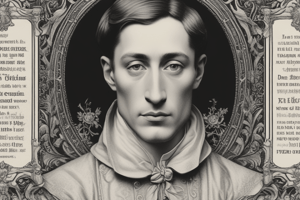Podcast
Questions and Answers
What is the significance of the verb 'pitch' in the line 'Pitched past pitch of grief'?
What is the significance of the verb 'pitch' in the line 'Pitched past pitch of grief'?
- It adds a sense of musicality to the poem
- It hints at the severity of the poet's suffering (correct)
- It implies a sense of competition with God
- It suggests a sense of hope and renewal
What is the effect of the metaphor 'My cries heave, herds-long'?
What is the effect of the metaphor 'My cries heave, herds-long'?
- It evokes an image of a flock without a shepherd (correct)
- It creates a sense of isolation and loneliness
- It suggests a sense of joy and celebration
- It implies a sense of weakness and vulnerability
What literary device is used in the line 'More pangs will, schooled at forepangs, wilder wring'?
What literary device is used in the line 'More pangs will, schooled at forepangs, wilder wring'?
- Alliteration
- Personification
- Metaphor
- Forceful use of alliteration (correct)
What literary device is used in 'wince and sing'?
What literary device is used in 'wince and sing'?
What is the poet's intention in using the image of the 'age-old anvil'?
What is the poet's intention in using the image of the 'age-old anvil'?
What is the significance of the line 'Hold them cheap may who ne'er hung there'?
What is the significance of the line 'Hold them cheap may who ne'er hung there'?
Flashcards
Significance of 'pitched past pitch of grief'
Significance of 'pitched past pitch of grief'
The verb 'pitch' suggests the extreme intensity of the poet's suffering, exceeding an ordinary level of grief.
Effect of 'My cries heave, herds-long'
Effect of 'My cries heave, herds-long'
The metaphor compares the poet's cries to a large group of animals without a leader, conveying a sense of loss and aimlessness.
Literary device in 'More pangs will, schooled at forepangs, wilder wring'
Literary device in 'More pangs will, schooled at forepangs, wilder wring'
Alliteration, using repeated consonant sounds ('p') creates a strong rhythmic effect and emphasizes the intensity of the pain.
Literary device in 'wince and sing'
Literary device in 'wince and sing'
Signup and view all the flashcards
Poet's intention with 'age-old anvil'
Poet's intention with 'age-old anvil'
Signup and view all the flashcards
Significance of 'Hold them cheap may who ne'er hung there'
Significance of 'Hold them cheap may who ne'er hung there'
Signup and view all the flashcards
Study Notes
Poem Analysis: "No worst, there is none"
- Written by Gerard Manley Hopkins, a priest, in Dublin when he was experiencing extreme mental anguish
- Petrarchan sonnet exploring themes of depression, suffering, and feelings of abandonment by God
Key Quotes and Analysis
- "No worst, there is none. Pitched past pitch of grief" - extreme pain with no limit, ambiguity around "pitch" adds depth
- "Comforter, where, where is your comforting?" - cries out to God, feeling abandoned, anadiplosis creates an echoing effect
- "My cries heave, herds-long; huddle in a main, a chief / Woe, world-sorrow" - metaphor of cries like a herd without a shepherd, weight of burden, suffering of all mankind
- "on an age-old anvil wince and sing" - horrific image of being held down and tortured without hope of amnesty
- "Then lull, then leave off. Fury had shrieked ‘No Ling-ering! Let me be fell: force I must be brief" - references Furies from Greek mythology, no pause in torture, quick and malevolent
- "O the mind, mind has mountains; cliffs of fall / Frightful, sheer, no-man-fathomed" - powerful evocation of insurmountable mental suffering, depths of the mind
- "Hold them cheap / May who ne’er hung there" - unless you've experienced it, you can't understand the horror of depression
- "Durance deal with that steep or deep. Here! / Creep, Wretch, under a comfort serves in a whirlwind" - endurance no match for the depths of depression, seeking comfort in the midst of turmoil
- "all Life death does end and each day dies with sleep" - only comfort is that life will end, and each day ends with sleep
Studying That Suits You
Use AI to generate personalized quizzes and flashcards to suit your learning preferences.




